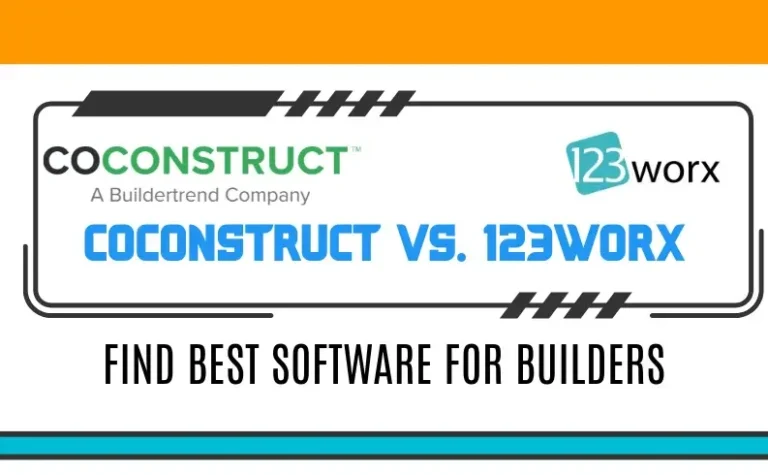Selecting the proper construction management software can be the difference between a small construction firm that wants to run smoothly, boost productivity, and stay profitable. While Procore is one of the most popular construction technology platforms, for smaller firms, it can sometimes prove too costly to learn, too expensive, and too cumbersome, being more suitable for enterprise-sized organizations.
Here we’ll explore the 7 best Procore alternatives that are better tailored to the needs, workflows, and budgets of small homebuilders and contractors. These applications are focused on usability, affordability, required functionalities, and flexibility, attributes most sought after by firms that manage a handful of projects as opposed to massive portfolios.
If you are a remodeler, custom builder, or general contractor with a small team, this guide will show you which of the software products are best suited to your company’s size and difficulties.
Understanding the Need for Procore Alternatives
The Limitations of Procore for Smaller Contractors
Procore offers a comprehensive toolset: tracking, document control, RFIs, schedules, financials, and safety modules. Nonetheless, small firms are intimidated by the system. But small companies get scared off by the system. Their pricing tiers (per-project or enterprise-wide) are based on larger firms, and prices escalate quickly beyond the scope of a small team. Onboarding is also complex, requiring substantial training that is often out of reach for skeleton crews.
Additionally, Procore has lots of functionality, but in our experience, it’s more than small construction firms need to run their business. Even smaller contractors have noted that they’re paying for functionality that they don’t use often.
Why Alternatives Make More Sense for Small Construction Teams?
Smaller firms need cost-effective, user-friendly tools that are quick to deploy. They don’t need 100+ integrations and enterprise-level reporting and analytics. They need to get fast access to project schedules, budgets, and documents, and not require hours of training before anyone can use it. That’s what Procore alternatives do: they are lighter, faster, and purpose-built to support smaller workflows
The best alternatives allow firms to:
- Monitor jobs in real-time
- Simplify document and contract management with lower friction
- Work effectively with others in practice
- Keep overheads low while still staying completely functional.
Key Features to Look for in Construction Management Software
Project & Team Management Tools
Above all, success for small construction companies is a matter of teamwork and synchronization. You’ll need Gantt charts and task assignments, and real-time project progress information available instantly at your fingertips. Look for solutions that will let you have deadline-oriented assignments, task dependencies, and automatic alerts sent to staff members when something is overdue or due.
In the meantime, embedded communication tools, such as messaging, mobile alerts, and shared dashboards, keep field teams and office personnel in sync. The most effective systems also offer mobile updating, so project managers or foremen can record progress as they go, right on the job site. By assigning role-based views, each team member can access only relevant information, which reduces confusion and unnecessary work.
Budgeting & Cost Control
Effective financial management is critical for smaller building firms. It’s important to have real-time dashboards on budgets, actual costs on the job, and on-the-fly invoicing. A system that includes change-order tracking and estimating templates provides smaller firms with the necessary flexibility to adjust to project scope changes.
Integration with QuickBooks or Xero, which many small builders already use, is another big plus no manual entry and real-time syncing of your financials. Small builders also appreciate cost transparency to ensure they will hit a profit margin and not have surprises during a project.
Document Management & Sharing
Construction teams deal with a lot of paperwork, plans, contracts, permits, RFIs, and invoices. A good software solution will keep all these documents organized in shared, secure cloud storage, with versioning so old files aren’t used.
Platforms demand permission-based access so that the right people can view or modify essential documents. Through mobile-optimized tools and tagging, field crews can call up what they need in a moment without going through email or paper folders. Document workflows save time and enhance compliance on each job.
Top 7 Procore Alternatives for Small Construction Companies
1. 123worx – A One-Stop Solution for One-Man Shoots

123worx was created for small to mid-size construction companies and is thus your best option among robust and affordable alternatives to Procore. The big enterprise systems require big-budget investments, but 123worx delivers essential features such as project calendaring, collaboration, job site cost, document control, CRM, and more through a streamlined modular system that grows with your business.
Its web-based interface ensures access from the site or office, and its role-based dashboards make work easier for accounting staff, foremen, or admins. It has powerful customizations, in-depth accounting integrations, and clear pricing, which makes it an ideal solution for growing contractors who seek cost reduction and tool centralization.
Best For:
- Residential construction
- Small- to mid-size general contractors
- Construction firms plan scale-up of operations
Read – List of the Best 10 Construction Management Software
2. Buildertrend – Great for Homebuilders & Remodelers

source – buildertrend.com
Buildertrend is among the most popular solutions used by remodelers as well as production residential homebuilders. It offers powerful client-facing capabilities, including real-time access to a schedule, proposal approvals, and homeowner portals. Buildertrend merges CRM functionalities with construction-centric functionalities like day logs, time tracking, budgeting, and subcontracting.
It also integrates with accounting applications like Xero and QuickBooks and is widely praised for its usability. It’s best suited to client experience-driven organizations, rather than deep internal customizations of workflows.
Best For:
- Remodelers
- Residential builders
- Teams prioritizing homeowner communication
3. CoConstruct – Built for Custom Home Projects

source – CoConstruct.com
CoConstruct targets custom builders or builders for design-build construction. It provides robust pre-construction tools like estimating and proposal templates and change order tracking and budgeting. One of its strongest suits is client collaboration that keeps clients engaged using shared updates, selections, and approvals.
Its compatibility with QuickBooks and its capability to work on various project types render it very versatile. Onboarding can, however, become a time-consuming experience for smaller users.
Best For:
- Custom builders
- Design-build firms
- High-touch client experiences
4. JobTread – Lean, Modern & Budget-Friendly

source – JobTread.com
JobTread offers a modern, elegant interface and a robust set of functionality centered around budgeting, job cost, invoicing, and CRM. If you’re a small firm that’s moving from outdated systems or spreadsheets, JobTread is easy to set up and won’t demand intensive training.
Its predictable cost and scalability make it ideal for small teams and start-ups. While it doesn’t have in-depth analysis and sophisticated integrations, it’s ideal for basic workflows and budget-conscious firms.
Best For:
- New software users
- Budget-conscious contractors
- Small work units involving job costing
5. Fieldwire – Best for Site Task Management

Image Source – fieldwire.com
Fieldwire is a collaboration and work-order tracking tool for fields. It’s ideal for foremen, subcontractors, and site managers tasked with handling their work, inspections, punch lists, and photos on-site via phone or tablet. Offline access ensures operability on job sites out in the field.
While it lacks financials and CRM capability, its field-first focus makes it a perfect complement to accounting software or for firms that want more jobsite control.
Best For:
- Site work crews and site supervision
- Site coordination
- Punch lists and inspections
6. Contractor Foreman – Affordable & Feature-rich

source – contractorforeman.com
Contractor Foreman delivers exceptional functionality for its price point by offering a robust set of features, which includes top construction estimating software, scheduling capabilities, time tracking options, and safety report generation, among others. The software can handle an unlimited number of projects and integrates with QuickBooks, so it is a very scalable solution for small and mid-sized contractors.
The system balances affordability and richness well. While the interface becomes busy quickly, especially for new users, Contractor Foreman is one of the strongest solutions out there for under $100/month.
Best For:
- Budget-mindful small contractors
- Teams that seek a well-rounded toolbox
- Contractors with variable pricing
7. Autodesk Build – Enterprise Power, SMB Friendly

Source – construction.autodesk.com
Autodesk Build integrates the legacy and reliability of Autodesk into a more construction manager-centric system. It can have enterprise DNA, but for smaller groups, if well-implemented, it is incredibly versatile. Document control, RFIs, submittals, scheduling, and field collaboration tools are just a few of its features.
Its tight integration with design programs like AutoCAD and Revit makes it best users contractors involved in design-build procedures. While heavier than a few on this list, it’s a future-proof option for teams focused on growth.
Best For:
- The Design-Build
- Teams needing BIM integration
- Tech-savvy small firms
Comparison Table: Procore Alternatives for Small Businesses
| Software | Best For | Client Tools | Financial Tools | QuickBooks Sync | Field Tools |
| 123worx | All-in-one for small contractors | ✅ Yes | ✅ Yes | ✅ Yes | ✅ Yes |
| Buildertrend | Remodelers, homebuilders | ✅ Strong | ✅ Yes | ✅ Yes | ✅ Yes |
| CoConstruct | Custom homes, design-build | ✅ Strong | ✅ Yes | ✅ Yes | ✅ Partial |
| JobTread | Budget-focused contractors | ✅ Basic | ✅ Yes | ✅ Yes | ✅ Partial |
| Fieldwire | Jobsite coordination | ❌ | ❌ | ❌ | ✅ Strong |
| Contractor Foreman | Cost-effective all-in-one | ✅ Basic | ✅ Yes | ✅ Yes | ✅ Yes |
| Autodesk Build | Design-build, BIM teams | ✅ Yes | ✅ Yes | ✅ Limited | ✅ Strong |
Choose the Right Tool for Your Construction Business
Choosing a Procore substitute will depend on the construction firm’s size, budget, and work type. Procore is powerful, but sometimes its functionality is beyond what smaller construction firms can use.
If you seek a single solution that’s customizable and can scale as designed, specifically for small contractors, 123worx is a top contender. A complete solution platform with outstanding support and effortless onboarding makes it the best alternative for enterprises that demand advanced power and minimal stress.
For specialty uses like residential remodeling or jobsite coordination, you can prefer Buildertrend or Fieldwire. Evaluate your workflows, budgeting, and growth on the horizon, and choose the tool that can aid, not obstruct, your success.

As a Vice President at 123worx, Construction Management Platform, Bharat Rudra has worked with hundreds of business executives searching for best-suited software for their construction business with a wide array of requirements. Bharat takes pride in helping construction businesses solve their business and project management challenges. Feel free to reach Bharat if you have any questions. You can find him on LinkedIn or reach him at brudra@123worx.com












